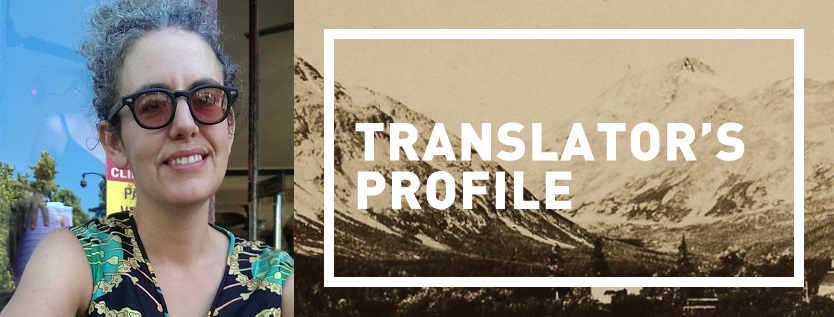Natasha Wimmer‘s translations include The Savage Detectives and 2666, by Roberto Bolaño. She lives in New York City.
***
Who are you? What do you translate?
In an attempt to avoid the obvious, I’ll borrow the 25-things-people-don’t-know-about-you meme from years ago. Except let’s make it five, and keep it translation-specific.
1) The first word I ever spoke in Spanish was ”hola”—except that I pronounced it ”olé.” 2) I learned lots of Spanish from watching dubbed versions of Highway to Heaven (Autopista hacia el cielo) and Murder She Wrote (Asesinato Escribió). 3) My first translation project was Pedro Juan Gutiérrez’s Dirty Havana Trilogy, which stretched my skills to the breaking point with its Bukowskian cool and scatological sex scenes. 4) I was once given the wrong draft of a novel and had to go back over every word of the translation to make sure it matched the proper version. 5) My working title for the translation of The Savage Detectives was The Wild Detectives. 6) (bonus point) I was convinced that American readers would respond better to The Savage Detectives than to 2666—the popular success of 2666 in the U.S. was a total surprise (to me, at least).
Describe your current/most recent project. Why is it cool? What should we know about it?
I recently finished a translation of Muerte súbita (Sudden Death), a novel by the Mexican writer Álvaro Enrigue. It’s about a tennis match between the painter Caravaggio and the Spanish poet, Francisco de Quevedo.The two were contemporaries, though there’s no evidence that they ever met on the tennis court. The match is intense, physically and emotionally. It’s also seriously funny—Enrigue is an unexpected master of slapstick humor. On another level, the novel is a commentary on the relationship between New World and Old. Enrigue teases out a connection between Quevedo and Cortés, and sees a link between the visionary art of pre-Conquest Mexico and Caravaggio’s radical canvases. Enrigue’s narrative occasionally breaks into first person, and it’s the author’s inquiring voice that connects all of the novel’s disparate parts and gives it a revelatory edge.
From the translator’s perspective, this was a particularly fun project because Enrigue is such an incorrigibly inventive writer. I wished that some of his free-wheeling responses to my translator queries could be incorporated into the manuscript (and in fact he does include an email exchange with a previous editor). To translate him is to assume some of his delicious facility with language and storytelling.
What is the best translated book you’ve read recently?
I’m hardly the first to fall for Elena Ferrante, but I just read The Lost Daughter, and I was reminded again why I love her so much. The Lost Daughter is much shorter, which means that it lacks the sustained intensity of the Neapolitan novels, but it’s equally discomforting. What I find so satisfying about Ferrante is that everything is spoken. So many contemporary novels rely on silence to deliver truths, but Ferrante goes in the other direction. She tells you something, talks you through it, and then she explains it again. At first this directness might give her novels an unsophisticated air, but her points acquire complexity through repetition and modulation. And, of course, there aren’t enough novels that consider motherhood in such a sustained, fierce way.
Where do you go for inspiration—translation, literary, or otherwise?
For literary-critical inspiration, I’ve recently turned to Chris Andrews’s brilliant book on Bolaño, Roberto Bolaño’s Fiction: An Expanding Universe, in which he reminds me (among many other things), that reading is about finding a model for living, and that philosophical and ethical questions are pertinent to the reading experience
In more general literary terms, I’ve recently been rereading some of my old favorite children’s books as my daughter reads them, and I’m reminded of how intoxicating it is to be carried away by fiction, to try on lives through books. Literature is a wonderful profession, but the professionalizing of the reading experience isn’t always a positive thing. I can’t enjoy escapist reading the way I used to, but I’m impatient with the dutiful kind of reading I feel I’m often expected to do. In general, I find it increasingly difficult to choose just the right books: novels that are ambitious in some way but that also speak to me on a philosophical or ethical or personal level (as per above).
What language do you wish you could speak/read?
I think about this a lot. I wish I could speak and read Russian—and one of these days, maybe I will. My sister is married to a Russian, several of my good friends are Russian speakers, and I have many Russian-speaking neighbors (most from the Central Asian former Soviet republics). One of my favorite non-classifiable books is Elif Batuman’s The Possessed: Adventures with Russian Books and the People Who Read Them, which I recommend to anyone who’s toying with the notion of devoting themselves to Russian literature (or any literature). And, of course, it would be useful to me as a teacher of translation to learn a non-Romance language, since my other languages are French and Italian.

